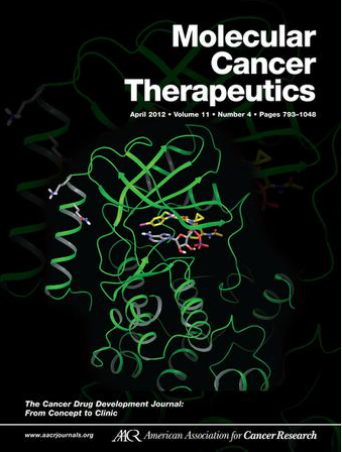摘要 B017:缺失 UXS1 可通过消耗嘧啶和诱导复制应激选择性地杀死 KEAP1 突变癌细胞株
IF 5.3
2区 医学
Q1 ONCOLOGY
引用次数: 0
摘要
Kelch-like ECH Associated-Protein 1(KEAP1)是非小细胞肺癌中第三大突变基因,与预后不良有关。KEAP1以核因子红细胞2相关因子2(Nrf2)为降解靶点,因此KEAP1突变的肿瘤中Nrf2水平升高,其转录靶点呈组成型表达。为了确定KEAP1突变肿瘤的潜在治疗靶点,我们查询了癌症依赖性图谱(DepMap)数据库,发现UDP木糖合成酶1(UXS1)是KEAP1突变癌细胞系中的合成致死相互作用基因。UXS1 是蛋白多糖(Proteoglycans)上合成糖胺聚糖(GAG)的关键蛋白,可将 UDP-葡萄糖醛酸(UDPGA)转化为 UDP-木糖。UDP葡萄糖脱氢酶(UGDH)是Nrf2的转录靶标,在KEAP1突变肿瘤中高度表达,它将UDP-葡萄糖转化为UDPGA。在敲除 UXS1 后,KEAP1 突变细胞和野生型细胞中的 UDP-xylose 都会消耗殆尽,而只有在 KEAP1 突变细胞中才会出现 UDPGA 的快速积累。这种代谢障碍会导致可用的 UDP 和其他嘧啶的短缺,从而导致 S 期进展减慢、DNA 复制叉标记停滞、随后的 DNA 损伤以及细胞活力的显著丧失。值得注意的是,对 UXS1 的依赖可以通过敲除 UGDH 来阻止 UDPGA 的积累,或者通过给细胞补充尿苷或胞苷来促进嘧啶挽救途径,从而恢复嘧啶核苷酸池。最后,我们还发现,在去除了 UXS1 的细胞中,DNA 复制应激会使细胞对临床细胞周期检查点抑制剂变得敏感,从而进一步打开了一扇可用于治疗的脆弱窗口。引用格式:Timothy Hoffman, Melat Gebru, Aaron Boudreau, Fei Han, Kelly Foster-Duke, Jessica Gajda, Ngoc Vu, Bryson Bennett, Michael Kort, Brad Shotwell, Jonathan Hickson, Noel Wilsomn, David Stokoe.缺失 UXS1 可通过消耗嘧啶和诱导复制应激选择性地杀死 KEAP1 突变癌细胞株 [摘要].In:AACR 癌症研究特别会议论文集:扩展和转化癌症合成脆弱性;2024 年 6 月 10-13 日;加拿大魁北克省蒙特利尔。费城(宾夕法尼亚州):AACR; Mol Cancer Ther 2024;23(6 Suppl):Abstract nr B017.本文章由计算机程序翻译,如有差异,请以英文原文为准。
Abstract B017: Loss of UXS1 selectively kills KEAP1 mutant cancer cell lines by depleting pyrimidines and inducing replication stress
Kelch-like ECH Associated-Protein 1 (KEAP1) is the third most mutated gene in non-small cell lung cancer and is associated with poor prognosis. KEAP1 targets nuclear factor erythroid 2-related factor 2 (Nrf2) for degradation, hence KEAP1-mutated tumors have elevated Nrf2 levels and constitutive expression of its transcriptional targets. To identify potential therapeutic targets for KEAP1 mutated tumors, we interrogated the cancer Dependency Map (DepMap) database and identified UDP Xylose Synthase 1 (UXS1) as a synthetic lethal interaction gene in KEAP1 mutated cancer cell lines. UXS1 is a critical protein for the glycosaminoglycan (GAG) synthesis on proteoglycans, converting UDP-glucuronic acid (UDPGA) to UDP-xylose. UDP glucose dehydrogenase (UGDH) is a transcriptional target of Nrf2 highly expressed in KEAP1-mutant tumors, which converts UDP-glucose to UDPGA. Upon UXS1 knock-down, depletion of UDP-xylose is seen in both KEAP1-mutant and wildtype cells, as expected, whereas rapid accumulation of UDPGA is only seen in the KEAP1-mutant setting. This metabolic roadblock causes a shortage of available UDP and other pyrimidines, resulting in slowed S-phase progression, stalled DNA replication fork marks, subsequent DNA damage, and significant loss in cell viability. Notably, dependency on UXS1 can be rescued by either knocking out UGDH to prevent UDPGA accumulation or by supplementation of cells with uridine or cytidine to restore the pyrimidine nucleotide pools by boosting pyrimidine salvage pathway. Finally, we show that DNA replication stress in UXS1-depleted cells renders them sensitive to clinical cell-cycle checkpoint inhibitors, opening a further window of therapeutically exploitable vulnerability.
Citation Format: Timothy Hoffman, Melat Gebru, Aaron Boudreau, Fei Han, Kelly Foster-Duke, Jessica Gajda, Ngoc Vu, Bryson Bennett, Michael Kort, Brad Shotwell, Jonathan Hickson, Noel Wilsomn, David Stokoe. Loss of UXS1 selectively kills KEAP1 mutant cancer cell lines by depleting pyrimidines and inducing replication stress [abstract]. In: Proceedings of the AACR Special Conference in Cancer Research: Expanding and Translating Cancer Synthetic Vulnerabilities; 2024 Jun 10-13; Montreal, Quebec, Canada. Philadelphia (PA): AACR; Mol Cancer Ther 2024;23(6 Suppl):Abstract nr B017.
求助全文
通过发布文献求助,成功后即可免费获取论文全文。
去求助
来源期刊
CiteScore
11.20
自引率
1.80%
发文量
331
审稿时长
3 months
期刊介绍:
Molecular Cancer Therapeutics will focus on basic research that has implications for cancer therapeutics in the following areas: Experimental Cancer Therapeutics, Identification of Molecular Targets, Targets for Chemoprevention, New Models, Cancer Chemistry and Drug Discovery, Molecular and Cellular Pharmacology, Molecular Classification of Tumors, and Bioinformatics and Computational Molecular Biology. The journal provides a publication forum for these emerging disciplines that is focused specifically on cancer research. Papers are stringently reviewed and only those that report results of novel, timely, and significant research and meet high standards of scientific merit will be accepted for publication.

 求助内容:
求助内容: 应助结果提醒方式:
应助结果提醒方式:


